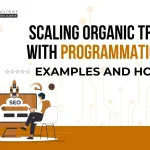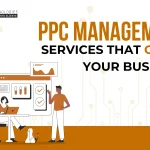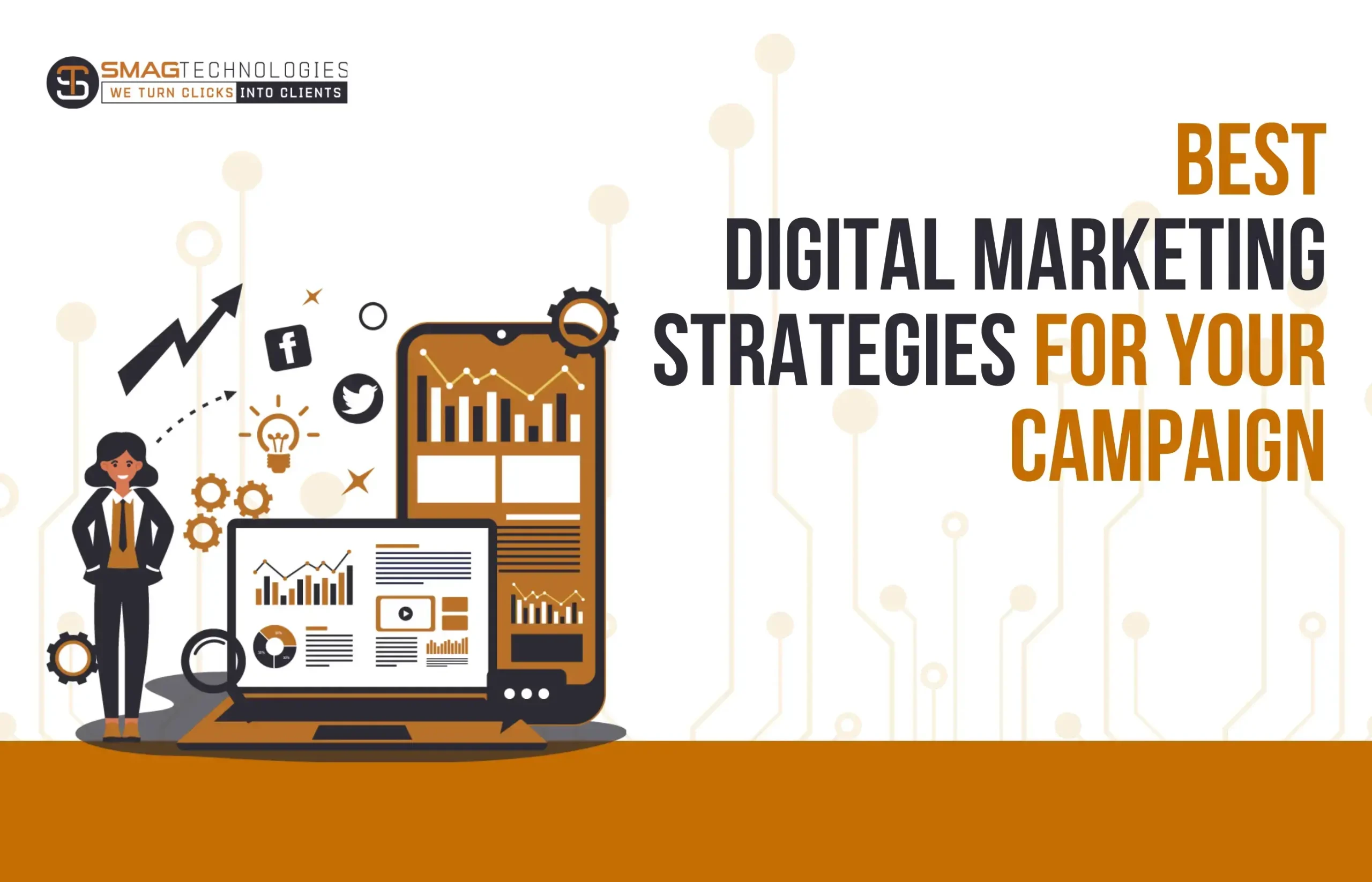As businesses continue to expand their online presence, digital marketing strategies have become an essential component of a successful marketing campaign. But what exactly is a digital marketing strategy, and how can you create one that drives real results for your business?
In this post, we’ll explore the best digital marketing strategies for your campaign, covering everything from building an effective strategy to measuring its success.
Understanding Digital Marketing Strategy
Before we dive into the best digital marketing strategies, let’s first define what a digital marketing strategy is and why it’s important.
What are Digital Marketing Strategies?
A digital marketing strategy is a plan that outlines how a business will use digital channels to achieve its marketing goals. It involves identifying your target audience, setting clear objectives and KPIs, and choosing the right digital marketing channels to reach your audience.
Why Do You Need Digital Marketing Strategies?
Without a clear digital marketing strategy, it can be challenging to know where to focus your efforts and how to measure success. A well-defined strategy ensures that all of your marketing efforts are aligned, helping you to achieve your goals more efficiently and effectively.
Key Components of a Digital Marketing Strategies
An effective digital marketing strategy typically includes the following components:
- Clear marketing goals and KPIs
- Defined target audience and buyer personas
- A unique selling proposition (USP)
- A content marketing plan
- A social media strategy
- A search engine optimization (SEO) plan
- A pay-per-click (PPC) advertising plan
- An email marketing plan
How to Create a Digital Marketing Strategy
Now that we’ve defined what a digital marketing strategy is and why it’s important, let’s dive into how to build an effective strategy for your campaign
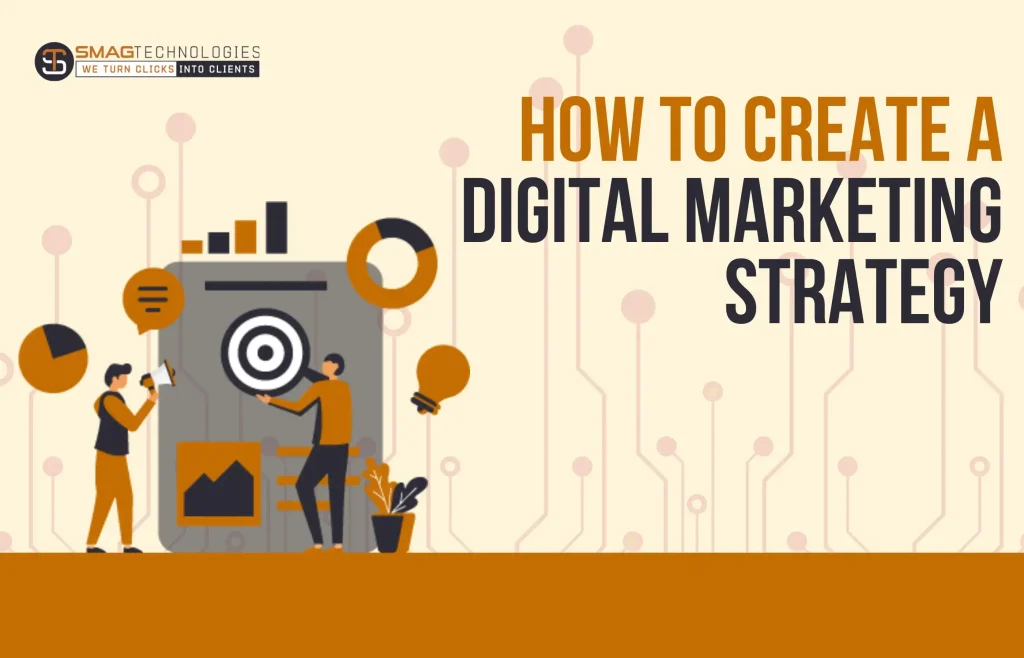
Defining Your Target Audience
Defining your target audience is a critical component of any digital marketing strategy. To effectively reach your audience, you need to understand who they are, what their pain points are, and what motivates them to make a purchase.
Identifying Your Unique Selling Proposition (USP)
Your unique selling proposition (USP) is what sets you apart from your competitors. It’s what makes your product or service unique and compelling to your target audience. Identifying your USP is critical to developing a messaging strategy that resonates with your audience.
Setting Goals and KPIs For Your Campaign
Your digital marketing goals should be aligned with your overall business objectives. Whether your goal is to increase brand awareness, drive website traffic, or generate leads, you need to set clear, measurable KPIs to track progress and measure success.
Choosing the Right Digital Marketing Channels
There are countless digital marketing channels to choose from, including social media, SEO, PPC advertising, email marketing, and more. To choose the right channels for your campaign, you need to understand your audience, your budget, and your marketing goals.
Key Digital Marketing Strategies to Consider
Now that you understand the key components of an effective digital marketing strategy, let’s explore some of the most effective digital marketing strategies to consider.
Search Engine Optimization (SEO)
SEO involves optimizing your website and content to rank higher in search engine results pages (SERPs). SEO is a critical component of any digital marketing strategy, as it helps to drive organic traffic to your website and increase brand visibility.
Pay-Per-Click Advertising (PPC)
PPC advertising involves placing ads on search engine results pages (SERPs) and other websites. PPC is an effective way to drive targeted traffic to your website and generate leads, as you only pay when someone clicks on your ad.
Social Media Marketing
Social media marketing involves leveraging social media platforms like Facebook, Twitter, and LinkedIn to build brand awareness and engage with your audience. Social media can be a powerful tool for reaching your target audience, as it allows you to connect with potential customers on a personal level.
Content Marketing
Content marketing involves creating and sharing valuable content with your audience to attract and retain customers. This can include blog posts, ebooks, infographics, videos, and more. Content marketing is a long-term strategy that can help establish your brand as a thought leader in your industry.
Email Marketing
Email marketing involves sending targeted emails to your audience to promote your products or services. Email marketing is an effective way to build relationships with your customers and keep them engaged with your brand.
Measuring the Success of Your Digital Marketing Strategy
Once you’ve developed your digital marketing strategy and started executing it, it’s important to measure its success. Measuring the success of your digital marketing strategy helps you understand what’s working and what’s not, so you can optimize your approach and improve results.
Key Metrics to Track
Some of the key metrics to track when measuring the success of your digital marketing strategy include website traffic, search engine rankings, social media engagement, lead generation, and sales. By tracking these metrics over time, you can identify trends and make data-driven decisions to improve your strategy.
Tools for Measuring Success
This involves implementing software tools and systems that can track user behavior and collect data about website traffic, user engagement, and other metrics. By doing so, companies can gain valuable insights into how users interact with their websites and online content.
Measuring Key Performance Indicators (KPIs)
These are specific metrics that help to quantify the success of a digital marketing campaign. Examples of KPIs might include website traffic, conversion rates, click-through rates, or social media engagement.
Analyzing Data to Identify Areas for Improvement
Once KPIs have been identified and measured, the next step is to analyze the data to identify areas for improvement. This might involve looking for patterns or trends in the data that can provide insights into user behavior or preferences. By analyzing this data, companies can better understand what is working well and what needs to be improved.
Adjusting Your Strategy Based on Data Insights
Finally, based on the insights gained from analyzing the data, companies can adjust their digital marketing strategy to improve its effectiveness. This might involve tweaking content or design elements, targeting different audience segments, or changing advertising strategies.
Best Practices for B2B Digital Marketing Strategies
Digital marketing is a crucial aspect of modern-day business, particularly for B2B companies looking to reach and engage their target audience effectively. Here are some best practices for creating an effective B2B digital marketing strategy.
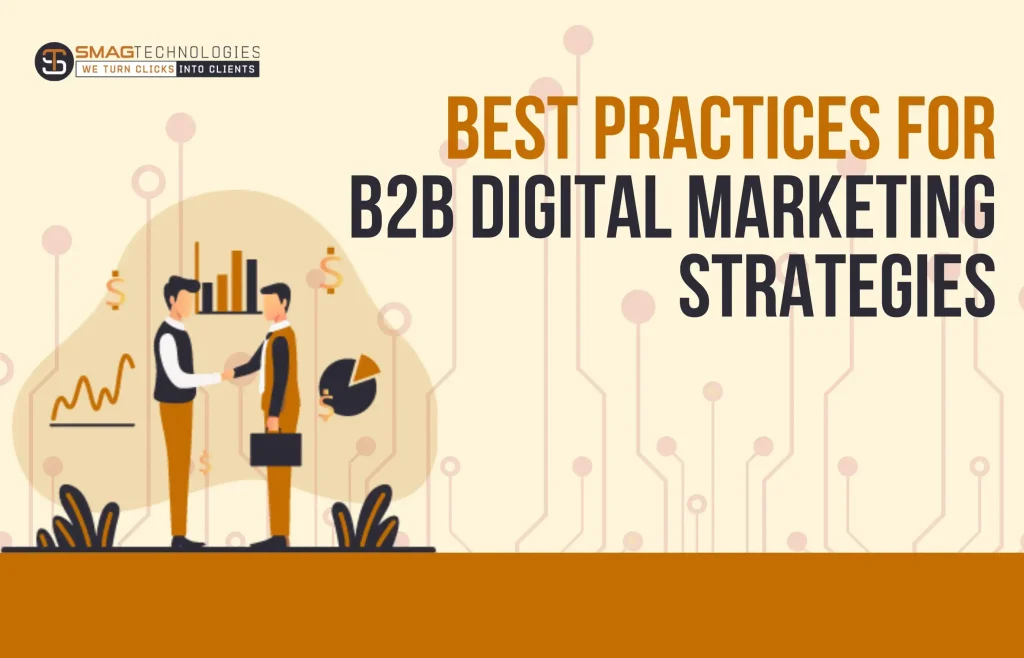
Focusing on Lead Generation and Lead Nurturing
One of the primary objectives of B2B digital marketing strategies is to generate high-quality leads that can be converted into customers. This requires a comprehensive lead generation strategy that encompasses various tactics, such as content marketing, email marketing, and social media marketing. Lead nurturing is also essential to keep prospects engaged and move them closer to a purchase decision.
Creating Targeted and Personalized Content
B2B buyers are looking for solutions that address their specific needs and pain points. Creating targeted and personalized content that resonates with your target audience is critical to driving engagement and conversions. This includes developing buyer personas, mapping content to the buyer’s journey, and creating content that is relevant and valuable to your audience.
Utilizing Account-Based Marketing (ABM)
Account-based marketing is a targeted approach to B2B marketing that focuses on specific accounts or high-value prospects. ABM involves personalized messaging, content, and campaigns designed to engage and convert key decision-makers within the target accounts.
Leveraging LinkedIn for B2B Marketing
LinkedIn is a powerful platform for B2B marketing, offering a range of tools and features for reaching and engaging with your target audience. From creating a compelling company page to running targeted advertising campaigns, LinkedIn can help B2B marketers build brand awareness, generate leads, and drive conversions.
Creating a Successful Digital Marketing Campaign
Creating a successful digital marketing campaign requires careful planning and execution. Here are some key elements of a successful campaign.
Creating a Content Calendar and Editorial Plan
A content calendar and editorial plan can help ensure that your campaigns are consistently delivering valuable and relevant content to your target audience. This includes mapping out content themes, topics, and formats, as well as identifying key dates and events to leverage in your campaigns.
Designing High-Converting Landing Pages
Landing pages are critical to converting prospects into leads or customers. Designing high-converting landing pages involves optimizing page layout, headlines, copy, and calls to action to encourage conversions.
Optimizing Your Website for Conversions
Your website is a critical touchpoint for B2B buyers. Optimizing your website for conversions involves ensuring that it is easy to navigate, loads quickly, and provides clear and concise messaging that aligns with your campaign objectives.
Testing and Optimizing Your Campaigns
Testing and optimizing your campaigns is an ongoing process that involves analyzing data and making data-driven decisions. This includes testing different messaging, content, and campaigns to identify what resonates best with your target audience and drives the highest conversions.
Evaluating the Effectiveness of Your Digital Marketing Strategy
Here are some key elements of digital marketing strategy.
Setting Up Tracking and Analytics
Setting up tracking and analytics is critical to capturing data that can be used to measure the effectiveness of your campaigns. This includes setting up Google Analytics or other tracking tools to capture website and campaign data.
Measuring Key Performance Indicators (KPIs)
Measuring key performance indicators (KPIs) is essential to understanding how well your campaigns are performing. This includes tracking metrics such as website traffic, leads generated, conversion rates, and ROI.
Analyzing Data to Identify Areas for Improvement
Analyzing data to identify areas for improvement involves reviewing campaign performance data to identify trends, patterns, and opportunities for optimization. This includes analyzing data from your website, social media channels, email campaigns, and other marketing channels to gain insights into your target audience’s behavior and preferences.
Adjusting Your Strategy Based on Data Insights
Based on the insights gained from analyzing data, it is essential to adjust your digital marketing strategy to optimize campaigns for better performance. This includes making data-driven decisions about which channels, tactics, and messaging to prioritize and adjusting your campaigns accordingly.
How to Get Started with Your Digital Marketing Strategy
If you are just getting started with your digital marketing strategy, there are several steps you can take to ensure success.
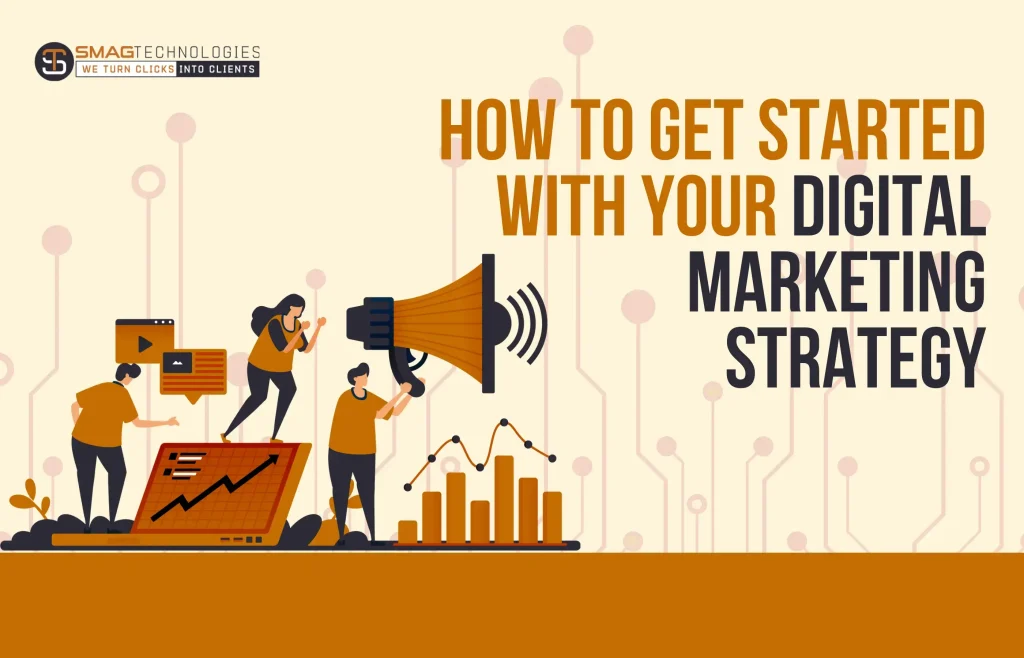
Conducting a Digital Marketing Audit
Conducting a digital marketing audit can help you understand your current digital marketing landscape and identify areas for improvement. This includes reviewing your website, social media channels, email campaigns, and other marketing channels to identify strengths, weaknesses, and opportunities.
Creating a Roadmap for Your Strategy
Creating a roadmap for your digital marketing strategy involves developing a clear plan for how you will achieve your marketing objectives. This includes identifying your target audience, developing buyer personas, setting goals and KPIs, and outlining the tactics and channels you will use to reach your audience.
Building a Team or Hiring a Digital Marketing Agency
Building a team or hiring a digital marketing agency can help you execute your digital marketing strategy effectively. This includes identifying the skills and expertise you need, creating job descriptions, and recruiting or outsourcing to fill those roles.
Putting Your Strategy into Action
Putting your digital marketing strategy into action involves implementing your tactics and channels, creating content, launching campaigns, tracking and analyzing its output, and then optimizing and implementing improvements can give the most benefit to effectively run and measure your digital marketing campaigns.
SMAG Technologies is Changing the Landscape
Based on the information provided, it is clear that digital marketing is a crucial component for any modern business looking to thrive in today’s digital landscape. With SMAG Technologies’ comprehensive range of digital marketing services, including search engine optimization, social media management, and email marketing, businesses can reach their target audience more effectively, build their brand reputation, and ultimately increase their sales and revenue.
At SMAG Technologies, we understand that every business is unique, and therefore, we work closely with our clients to develop customized digital marketing strategies that are tailored to their specific needs and goals. By leveraging the latest technologies and industry best practices, our team of experienced digital marketing experts helps businesses stay ahead of the competition and achieve long-term success.
So, whether you’re looking to increase your online visibility, drive more traffic to your website, or generate more leads and conversions, SMAG Technologies has the expertise and experience to help you achieve your goals. Contact us today to learn more about our digital marketing services and how we can help take your business to the next level.
 seolounge
seolounge